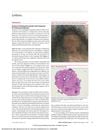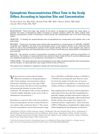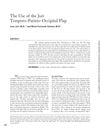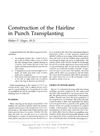 19 citations,
February 2012 in “International Journal of Urology”
19 citations,
February 2012 in “International Journal of Urology” In Japan, sex reassignment surgery for gender identity disorder faces challenges and needs better medical support and education.
 17 citations,
August 2019 in “JAMA Facial Plastic Surgery”
17 citations,
August 2019 in “JAMA Facial Plastic Surgery” Some men lost hair after deoxycholic acid treatment for neck fat, but most saw improvement or resolution.
 16 citations,
July 2002 in “Australasian Journal of Dermatology”
16 citations,
July 2002 in “Australasian Journal of Dermatology” A woman with lupus experienced skin death due to a blood clotting disorder after stopping a blood thinner, which healed with treatment.
 15 citations,
October 2017 in “Dermatologic Clinics”
15 citations,
October 2017 in “Dermatologic Clinics” New treatments for male hair loss show promise but need more research for safety and effectiveness.
 15 citations,
July 2002 in “Australasian Journal of Dermatology”
15 citations,
July 2002 in “Australasian Journal of Dermatology” Two plywood factory workers developed contact dermatitis from phenol-formaldehyde resin, a known allergen.
 13 citations,
October 1993 in “International Journal of Dermatology”
13 citations,
October 1993 in “International Journal of Dermatology” Minoxidil effectively promotes hair regrowth in younger patients with small balding areas.
 10 citations,
April 2018 in “Facial Plastic Surgery”
10 citations,
April 2018 in “Facial Plastic Surgery” The surgical technique of scalp advancement and pretrichial brow lift shortens the forehead and lifts brows, is good for women and transgender women with high foreheads, but not recommended for men and has some risks.
 10 citations,
May 2013 in “Actas Dermo-Sifiliográficas”
10 citations,
May 2013 in “Actas Dermo-Sifiliográficas” Most white Spanish women have a widow's peak, and their hairline measurements could help in hair restoration surgery.
 10 citations,
July 2002 in “Australasian Journal of Dermatology”
10 citations,
July 2002 in “Australasian Journal of Dermatology” Careful management of blood thinners is crucial for lupus patients with APS.
 8 citations,
November 1990 in “Archives of Dermatology”
8 citations,
November 1990 in “Archives of Dermatology” A woman with EMS showed unusual skin mucinosis without the typical hard skin syndrome, suggesting EMS can cause skin mucinosis.
 7 citations,
December 1987 in “Fertility and sterility”
7 citations,
December 1987 in “Fertility and sterility” The vellus index is a simple, quick, and reliable method to assess and monitor hair growth, especially in hirsutism.
 6 citations,
February 2019 in “JAAD case reports”
6 citations,
February 2019 in “JAAD case reports” Acitretin helped improve hand mobility and skin condition in a patient.
 5 citations,
January 2014 in “International Journal of Trichology”
5 citations,
January 2014 in “International Journal of Trichology” Hair loss on the lower legs is common in middle-aged men, usually harmless, and doesn't need treatment.
 5 citations,
September 2000 in “Dermatologic Surgery”
5 citations,
September 2000 in “Dermatologic Surgery” Lower hairlines using the rule of thirds can be used in hair transplants due to improved techniques.
 4 citations,
February 2020 in “Journal of Cosmetic Dermatology”
4 citations,
February 2020 in “Journal of Cosmetic Dermatology” Trichoscopy helps diagnose hairline recession causes in Egyptian women, with androgenetic alopecia being the most common.
 4 citations,
October 2018 in “Cell Stem Cell”
4 citations,
October 2018 in “Cell Stem Cell” Hox genes control hair growth patterns in mammals by regulating stem cell activity in the skin.
 4 citations,
July 2016 in “Dermatologic Surgery”
4 citations,
July 2016 in “Dermatologic Surgery” Higher epinephrine concentration and specific injection sites increase scalp vasoconstriction time.
 3 citations,
September 2017 in “Pediatric Dermatology”
3 citations,
September 2017 in “Pediatric Dermatology” Avoiding allergens can improve skin and hair conditions in adults with allergic reactions.
 3 citations,
January 2010 in “Elsevier eBooks”
3 citations,
January 2010 in “Elsevier eBooks” The document describes various skin conditions, their features, and treatments but lacks detailed study size information.
 3 citations,
February 1996 in “Dermatologic Surgery”
3 citations,
February 1996 in “Dermatologic Surgery” Walter P. Unger suggests using advanced hair transplant techniques for broader coverage, as they provide natural results and use donor tissue efficiently, while also recommending personalized planning due to the unpredictable progression of baldness.
 2 citations,
August 2013 in “British Journal of Dermatology”
2 citations,
August 2013 in “British Journal of Dermatology” Chemotherapy improved a girl's painful foot condition linked to pachyonychia congenita.
 2 citations,
November 2011 in “Journal of Infection”
2 citations,
November 2011 in “Journal of Infection” A woman with asthma improved from a severe fungal infection after treatment change, and most HIV-positive women in a UK study had low immune cell counts but were responding well to treatment.
 2 citations,
May 2005 in “Seminars in Plastic Surgery”
2 citations,
May 2005 in “Seminars in Plastic Surgery” The Juri Temporo-Parieto-Occipital Flap is a good option for scalp reconstruction and hairline restoration with a natural look, despite some risk of necrosis and scarring.
 2 citations,
January 1985 in “Facial Plastic Surgery”
2 citations,
January 1985 in “Facial Plastic Surgery” The paper concludes that for natural-looking hair restoration, it's important to create an irregular hairline, use appropriately sized and angled grafts, and ensure a snug fit between grafts and recipient sites.
 1 citations,
June 2012 in “Revista Brasileira de Cirurgia Plástica”
1 citations,
June 2012 in “Revista Brasileira de Cirurgia Plástica” The procedure is effective for reducing the forehead despite potential for visible scars.

Hair loss in young men in Central India is linked to severe heart disease.
 August 2018 in “Journal of the American Academy of Dermatology”
August 2018 in “Journal of the American Academy of Dermatology” A new cosmetic cream reduced facial redness and skin temperature after 4 weeks of use.
 October 2017 in “Indian heart journal”
October 2017 in “Indian heart journal” Obesity is an independent risk factor for early coronary artery disease (CAD) and its severity is not affected by age.
 January 2016 in “Springer eBooks”
January 2016 in “Springer eBooks” The document concludes that there are various causes and treatments for hair loss, with hair transplantation being a notable option.
 September 2011 in “Clinical Biochemistry”
September 2011 in “Clinical Biochemistry” Glycoconjugates help heal hair follicles during skin repair.






























